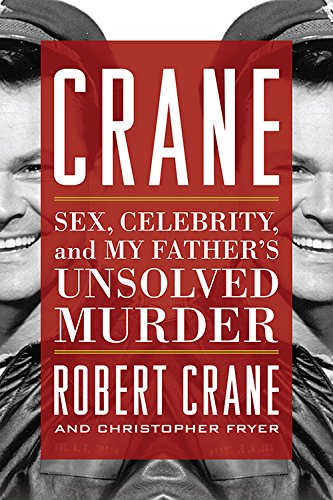
Robert Crane has stories to tell, that’s for sure. His dad starred in a popular 1960s TV series,
and was found murdered in a Scottsdale Arizona apartment in 1978. If that sordid saga isn’t enough, Crane also
carved out his own little niche in Hollywood, interviewing celebrities for magazines,
writing a biography of Jack Nicholson, and spending several years as John
Candy’s manager.
Crane’s extremely readable autobiography Crane:
Sex, Celebrity, and My Father's Unsolved Murder, (co-written with his longtime writing
partner Christopher Fryer) has
a strange duality about it. One chapter will be about Bob Crane, who starred as
Colonel Hogan in CBS’s Hogan’s Heroes, and the next will be about young Robert,
who adroitly describes the snags that can come with having a famous
father. And while the rest of the
country was shocked to learn that the elder Crane was a roving sex addict with
a penchant for filming himself in the act, Crane had known about it for years.
At one point he suggests his randy dad should’ve been neutered. “That,” Crane
writes, “might have helped.”
Still, there’s something ultimately warmhearted about
Crane’s story, and as we learn about this “happy go lucky show business family”
succumbing to various pressures, the Cranes begin to symbolize every bit of
innocence lost during the hectic 1960s.
Hell, Bob Crane even got his start on the old Donna Reed show. How’s
that for a symbolic arc?
Crane, who has written extensively for various top magazines, can tell a good story. Chapters about playing
games with his dad, or hanging out at WICC in Bridgeport, Connecticut, while
the old man worked his radio show, are told with a kind of homespun warmth.
This is no easy trick, because daddy Crane’s idea of fun was to find a copy of Deep Throat and re-edit it with sounds
from the Johnny Carson show (“Hi Yo!), as if he was trying to create the mashup
of cheap thrills and cheap TV that swam around in his head. The elder Crane was a mercurial sort, who not
only excelled as a radio personality, but was also a competent jazz drummer, and an actor who aspired to be
the new Jack Lemmon. But all Bob Crane
could do once Hogan was canceled was to tour the country’s dinner theaters and
score with the star fuckers of the hinterlands.
He piled them up like pancakes while a twisted feeb named John Carpenter
filmed the sessions. Again, hi yo!
The generally accepted story is that Carpenter lost his
temper when Bob Crane told him they were through as a team. Angered that he’d
no longer have access to Bob’s throwaways, Carpenter allegedly bludgeoned the
actor with a tripod, leaving him with a head that looked like a squashed melon.
The case was never solved, but Robert Crane has another suspect in the story,
and it’s none other than his father’s second wife, who certainly had her own
reasons for wanting to see her actor/husband dead. The author doesn’t sew up
all the loose angles, but he’ll have you wondering.
Crane also goes back in time to revisit his own career,
first as a magazine writer and aspiring filmmaker, than as a member of Candy’s
crew. There’s some inside showbiz stuff, including a funny bit involving Chevy
Chase, and a fascinating section that shows Jack Nicholson morphing into a neurotic
Hollywood phony in just a matter of years. There’s also enough family
squabbling to make you glad you didn’t grow up in La-La land. Crane often
compares his life to a Fellini movie. It’s worse. But he succeeds in depicting
his dad as not just a degenerate sex-fiend. Judging by the tales shared in this
book, Bob Crane was a funny, nice man, and a good, if occasionally absentminded
father. His vices led him into some dark
places. Still, many people could’ve had the same habits and not end up dead.
The truth is that Bob Crane had bad luck to go along with his bad taste.
The author also shares some sad personal moments, such as
the death of his first wife, and the early passing of his buddy Candy. In the
end, though, this is a story about a man whose father was murdered. Crane isn't too impressed by the idea of “closure”, though he does end the book with scene at an
auction house where Colonel Hogan’s leather jacket is sold for a pretty good
price. Fellini? More like Billy Wilder.
The story reminded me of a theory among psychologists that
all men take up professions designed to impress their fathers. It’s interesting that the son of a sex
addict has been a longtime contributor to ‘Playboy’, perhaps hoping he'll get the old man’s attention if he's close enough to the centerfold.
- Don Stradley
Interesting! I grew up watching Hogan's Heroes, that was a great show. So sad how is death has never been solved and a son looking for closure.
ReplyDeleteThis comment has been removed by a blog administrator.
ReplyDelete